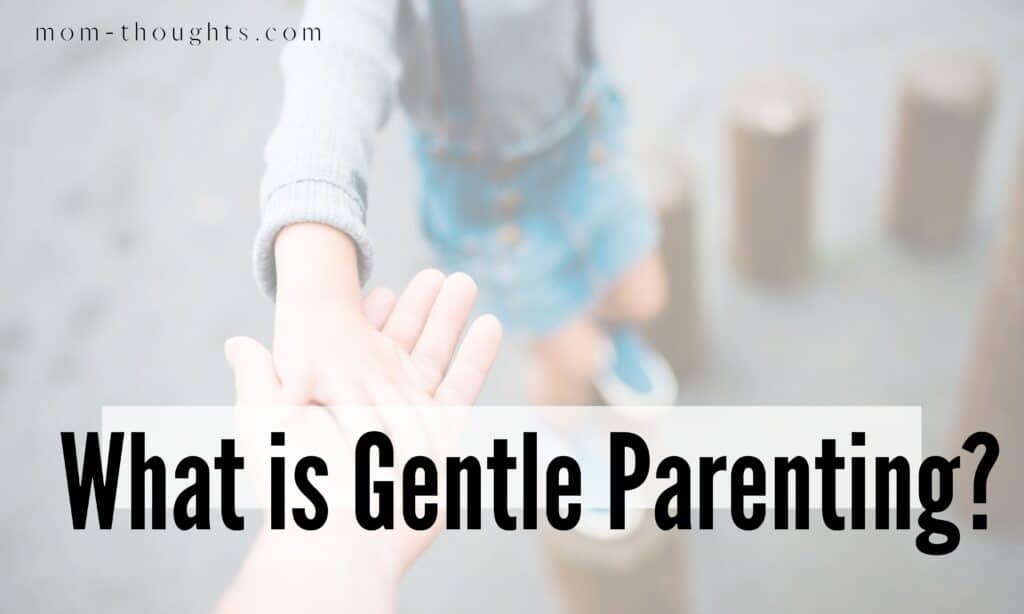
What Is Gentle Parenting?
Are you wondering if Gentle Parenting is the right parenting style for you?
There are countless parenting styles to choose from, which can be overwhelming.
Parents often don’t put a lot of thought into the specific parenting style that they are using. More often than not it’s just something that parents “fall into”. In fact, many people approach parenting by mimicking the way that they were raised. (Even if they don’t realize that they’re doing that!)
Often times your parenting style is unintentional and there isn’t an approach or strategy that is being applied. It even differs from day to day.
For example, when you’re stressed out from a long day, you’re much quicker to yell and punish poor behavior. Whereas if you’ve had a low stress day you may be more “go with the flow” and lenient with rules.
As a means for providing for my family, I may earn commissions if you shop through the links on this page at no additional cost to you.

Gentle Parenting has become a common parenting approach to raising children. It’s the complete opposite of the “old school” authoritarian parenting style.
Authoritarian Parenting operates on the belief that children should fear their parents and elders. This often creates an environment and parent-child relationship where the child does not feel safe to go to their parents with questions or concerns.
Gentle Parenting is designed to promote a positive and healthy relationship between parent and child built on flexibility, understanding and options.
If you think Gentle Parenting may coincide with your belief system, then you’ll want to check out “The Gentle Parenting Book” by Sarah Ockwell-Smith.
This book goes into great detail regarding this popular parenting style.

The Gentle Parenting Approach
You give your child choices and more freedom to lead the way. There still needs to be boundaries and limitations to ensure the child’s safety and well-being. However those limitations and boundaries are reserved for the big stuff. Other boundaries are not so concrete.
Choices and Flexibility
Choices and flexibility are key elements of this parenting style.
EXAMPLE:
You can’t allow a child to eat ice cream for breakfast, lunch and dinner. But you can allow for choices and flexibility with what they do eat.
Let’s say you made chicken, peas and potatoes for dinner and your child doesn’t want to eat the peas.
With Gentle Parenting, you wouldn’t force or demand that they eat the peas. Rather you would understand that your child is their own person, with their own individual likes and dislikes.
As their parent, you would acknowledge that they don’t like peas and incorporate a different healthy vegetable at the next meal.
Punishment and Rewards
Gentle Parenting doesn’t use rewards or punishments based on behavior.
Many parenting styles use a reward system such as a “Behavior Chart” where the child is rewarded with stickers or prizes for good behavior throughout the day.
People who practice Gentle Parenting do not view such reward systems as necessary or effective.
On the opposite end of the spectrum poor behavior is not met with punishment. However, it is important to note that poor behavior is not ignored either!
Instead of punishing the child it’s treated as a learning and growth opportunity.

Understanding, Empathy and Mutual Respect
Gentle Parenting also takes into account the fact that children are not miniature adults that have the same mental and emotional intelligence as their elders.
So it’s understood that children’s brain development is still underway and therefore expectations should be appropriately adjusted.
A lot of people get this parenting style confused with Attachment Parenting.
And while they have similarities and often compliment each other they are actually different philosophies.
Attachment Parenting vs. Gentle Parenting
Attachment Parenting:
People who practice Attachment Parenting follow a specific set of principles. As outlined by WebMD the 8 Principles of Attachment Parenting are:
- 1) Prepare for pregnancy, birth, and parenting
- 2) Feed With Love and Respect
- 3) Respond With Sensitivity
- 4) Use Nurturing Touch
- 5) Engage in nighttime parenting
- 6) Provide constant loving care
- 7) Practice positive discipline
- 8) Strive for balance in personal and family life
Gentle Parenting:
Gentle Parenting is more flexible and simply a way of being. There aren’t specific rules to follow. It’s a very natural parenting approach using understanding, empathy and respect to determine how to react in different situations.
It allows for fluid and intuitive reactions based upon your specific child and their emotional, physical and mental needs. So there isn’t a strict rule book that you’re following with this approach.
Check out these helpful Parenting books



Common Myths About Gentle Parenting
Myth 1: It’s “push over” parenting style where you let your child do whatever they want.
Actually, there are still boundaries and limitations and children are expected to behave and be respectful.
However the expectations are more reasonable based upon the emotional intelligence and brain development at that age.
Myth 2: It creates Spoiled Kids
It’s important to remember that Gentle Parentings doesn’t mean that someone lets their kids walk all over them. There is still a parent-child hierarchy. But it’s about how you respond to different situations and behaviors. In reality, not all behavior warrants a time-out.
For example, if a child is getting into the pantry when they shouldn’t be and they spill a bag of chips on the floor you don’t need to yell and throw them in time-out. If you’re practicing Gentle Parenting, you’d likely instead have them clean up the mess and calmly explain to them why they can’t get into the pantry without your help.
Conclusion
The important thing to remember is that there are many different ways to parent a child. What works for some families, may not work for others. And that is okay! So always make sure you’re doing what works best for your child, your family, and yourself.
The best thing that parents can do is to educate themselves on all of the options. And if you ever have concerns with your child’s development or behavior, be sure to consult your pediatrician.
More Toddler Resources:
How To Manage Screen Time – Free Printable!
15 Best Potty Training Books For Toddlers and Parents
How To Actually Enjoy A Beach Vacation With Toddlers
Surviving A Road Trip With Toddlers
